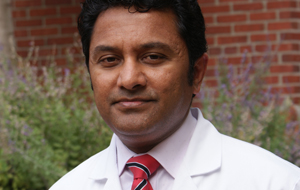 |
UNMC’s Chandra Are, M.D., has led the development of a partnership between the medical center and Osmania Medical College in Hyderabad, India. |
A memorandum of understanding (MOU) has been signed between UNMC and the Directorate of Medical Education in Andhra Pradesh, India. The MOU will allow UNMC to partner with Osmania Medical College in Hyderabad, India, which is in the state of Andhra Pradesh. The partnership allows for an exchange of students, resident physicians and faculty.
Initially, the exchange would involve the two medical schools, said Chandra Are, M.D., assistant professor in the UNMC Department of Surgery, Division of Surgical Oncology. Eventually, he hopes it will be extended to include other academic units such as the College of Nursing, the College of Dentistry and the School of Allied Health Professions.
“This is a significant accomplishment, as Osmania is among the top medical schools in all of India and considered to be one of the best medical schools in Southern India,” Dr. Are said. “We think this will be a win-win for both institutions.”
Agreement fits nicely with other international partnerships
The agreement ties in nicely with UNMC’s established partnerships in China, said UNMC Chancellor Harold M. Maurer, M.D.
“China and India are growing their science expertise in competition with the world’s scientific community,” he said. “We already have a deep and mutually beneficial relationship with two Chinese universities – the Chinese Academy of Sciences in Beijing and Shanghai Jiao Tong University School of Medicine.
“These schools have sent their faculty, Ph.D.s, post-doctoral students and medical students to UNMC on an exchange basis. We would like to develop the same relationship with similarly strong medical science institutions in India.”
India is a powerful collaborator
India has 28 states and more than 1.17 billion people — more than three times the United States’ population of 307 million.
With a population of 76 million, Andhra Pradesh is one of the largest states in India. There are 14 public medical schools controlled by the Directorate of Medical Education in Andhra Pradesh, Dr. Are said.
A rare agreement
“This is a unique agreement,” he said. “It is the probably the only one that involves a U.S. medical center and all the public medical schools of an entire state in India.”
Osmania Medical College is attached to more than 10 different hospitals, Dr. Are said. The main hospital, Osmania General Hospital, is a very large facility with 1,168-beds – nearly twice the size of The Nebraska Medical Center.
A huge volume of patients is seen annually at this hospital, he said, including more than 600,000 out-patients and 60,000 in-patients. More than 14,000 major surgeries and nearly 40,000 minor procedures are done there each year, which should provide a fertile learning environment for students and resident physicians, Dr. Are said.
In addition, the college is special in that it has a separate hospital for almost each specialty. These specialties include:
- Cancer;
- Tropical diseases;
- Pediatrics;
- Maternity;
- Mental health;
- Chest;
- Eye;
- Ear-nose-throat; and
- Rural health.
“India is very compatible with the United States,” Dr. Are said. “India and the United States are the world’s largest democracies and share the same free-market principles. Since English is the language of instruction in medical schools, there will be fewer language barriers for exchange students, residents and faculty. Travel in the country is easy, and — like China — India is a country with a rising economy.
“This will be a tremendous cross cultural experience for our students, residents and faculty. It will allow them to encounter diseases that aren’t seen in the U.S. and also get a first-hand look at how the same diseases are cared for in a resource-poor environment.”
Partnership benefits run two ways
Dr. Are said the partnership will likewise enlighten participants from Osmania.
“It will expose the Indian students and physicians to a wide variety of state-of-the-art approaches in treating patients with different diagnoses here in the U.S., and it will allow them to see how academic medical centers in the U.S. are invested in research,” he said.
More collaboration with India to come
The new partnership is a good fit for UNMC, said Ward Chambers, M.D., coordinator of UNMC’s International Health and Medical Education program.
“We’ve become very interested in Southeast Asia over the past few years, and we now have strong programs in Afghanistan and China. It just makes sense to add a strong science-based country like India to the mix,” he said. “Eventually we hope to add research to the partnership, but we first have to get our educational program established.”
Dr. Chambers noted that the new dean of the UNMC College of Public Health, Ayman El-Mohandes, M.B.B.Ch., M.D., M.P.H., has ties in India and that UNMC hopes to build upon those ties.